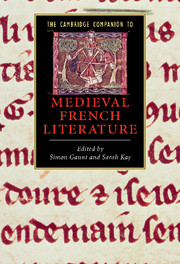Book contents
- Frontmatter
- Introduction
- Part I What is a Medieval French Text?
- Part II What is a Medieval French Author?
- Part III What is the Value of Genre for Medieval French Literature?
- 9 Narrative genres
- 10 Lyric poetry of the later Middle Ages
- 11 Genre, parody, and spectacle
- 12 Theatre and theatricality
- Part IV How can we read Medieval French Literature Historically?
- Appendix: Reference works for Old and Middle French
- Bibliography of medieval French texts
- Suggested Further Reading
- Index
- Series List
10 - Lyric poetry of the later Middle Ages
from Part III - What is the Value of Genre for Medieval French Literature?
Published online by Cambridge University Press: 28 March 2009
- Frontmatter
- Introduction
- Part I What is a Medieval French Text?
- Part II What is a Medieval French Author?
- Part III What is the Value of Genre for Medieval French Literature?
- 9 Narrative genres
- 10 Lyric poetry of the later Middle Ages
- 11 Genre, parody, and spectacle
- 12 Theatre and theatricality
- Part IV How can we read Medieval French Literature Historically?
- Appendix: Reference works for Old and Middle French
- Bibliography of medieval French texts
- Suggested Further Reading
- Index
- Series List
Summary
On 25 November 1392, Eustache Deschamps, indefatigable versifier, completed what he calls an Art de dictier - a treatise on the art of composing verse. It may have been intended for Louis, duke of Orléans, and as such directed primarily at the amateur, courtly, poet rather than at the sort of professional who frequented what are called Puys d'amour (poetic competitions, often for hugely elaborate serventois expressing devoted service to the Virgin rather than secular love poems); Deschamps does not, he says, intend to prescribe rules for such verse forms, because 'it has not been the custom for noble men to compose [them]' (82). This, the earliest known treatise in French on the subject, starts rather ponderously with a discussion of the seven liberal arts, and comes finally to the seventh, music, 'the medicine of the seven arts' (61); it is on this last section that I want to concentrate.
Deschamps is distinctly convoluted. There are, he says, two sorts of music, the artificiele and the naturele (60). Musique artificiele - 'artificial' because it demands 'art' - need not detain us: it embraces the music of instruments and the music of song, and it requires the trained ability to understand, if not read, music. What is interesting here is what Deschamps calls musique naturele, 'an oral music producing words in metre' (63). By contrast with artificial music, it cannot in essence be taught, or rather, it cannot be taught to anyone who is not naturally gifted. Certainly, anyone can learn the mechanics of verse - how to produce a competent ballade or a decent rondeau - but natural music stems from innate ability, and, spontaneously, from inspiration: from love, for instance, 'amorous desire in the praise of women' (63).
- Type
- Chapter
- Information
- The Cambridge Companion to Medieval French Literature , pp. 153 - 166Publisher: Cambridge University PressPrint publication year: 2008
- 1
- Cited by



